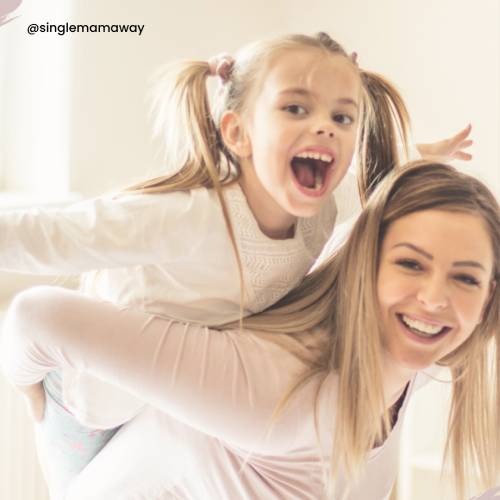
The power of self-acceptance: How to raise thriving kids.
- March 8, 2024
- | By Single Mama Elle

How to raise thriving kids: the power of self-acceptance.
Single mothers are in charge of moulding their children’s future, not just through the actions they take but through their attitude towards themselves. Self-acceptance, a journey of acknowledging and embracing one’s strengths and weaknesses without judgment, plays a pivotal role in shaping the young minds of our children. This article explores the profound impact a mother’s self-acceptance has on her children’s development of self-esteem, emotional intelligence, and resilience. For single mothers navigating the complexities of parenting solo, demonstrating self-love and acceptance isn’t just a personal triumph but also a legacy passed on to their children.
The Mirror Effect: Modeling Self-Acceptance
Children are like giant sponges, soaking up everything around them. They mirror the behaviours, attitudes, and emotional responses they see in grown-ups, especially their parents. When a single mother practices self-acceptance, she sets a powerful example for her children, teaching them to view themselves with kindness and compassion. This modelling goes beyond words, embedding itself in the fabric of their self-esteem and worldview.
Self-Esteem: The Foundation of Confidence
A single mother’s self-acceptance nurtures her children’s self-esteem by showing them that worth isn’t solely tied to perfection or external validation. Children learn to appreciate their unique qualities and accept their imperfections as part of their individuality. This acceptance becomes the foundation of a robust and positive self-image. It encourages our children to approach life with confidence and resilience.
Self-acceptance in parents plays a crucial role in shaping children’s mental health and well-being. According to the National Center for Biotechnology Information, parental acceptance, characterised by emotional warmth and positive parenting styles, contributes to the development of self-esteem, healthy personality traits, and improved adolescent mental health. (“Parenting Style and Adolescent Mental Health: The Chain Mediating Effects of Self-Esteem and Psychological Inflexibility”)
Emotional Intelligence: Navigating Emotions with Grace
Studies have shown a close link between self-acceptance and emotional intelligence—the ability to understand and manage one’s emotions and empathise with others. (Pânișoară)
When children see their mother accepting her emotions without judgment, they learn to do the same. For instance, when conflicts arise between siblings, a self-accepting mother displays effective conflict resolution by calmly addressing emotions without judgment.
These moments of maternal emotional intelligence are powerful lessons that teach children to embrace their emotions, communicate effectively, and navigate complex emotional terrains with grace. In turn, our children develop a strong foundation for their own emotional well-being and interpersonal relationships.
Resilience: The Strength to Overcome
Resilience, the remarkable ability to bounce back from adversity, is profoundly shaped by a mother’s self-acceptance. Single mothers who wholeheartedly embrace their journey – setbacks and all, become powerful role models for their children. In these moments of self-acceptance, challenges cease to be perceived as failures but rather as transformative growth opportunities.
We know how most single mothers face financial difficulties. Instead of caving into despair, a resilient mum openly acknowledges the challenge. This shows her children that setbacks are temporary and don’t define one’s worth. This positive perspective instils in our children the belief that they are strong enough to overcome any obstacle.
Demonstrating Self-Love and Acceptance in Everyday Situations
For single mothers, the question often arises: How do I teach my children to love themselves just by the way I act around them? Here are practical tips for incorporating self-love and acceptance into daily life:
- Practice Self-Care: Show your children that taking care of your physical and emotional well-being is a priority. Whether it’s a simple act of taking a relaxing bath, engaging in a hobby, or exercising, demonstrate that self-care is an essential part of life.
One single mother in our community, Amanda, found solace in the simplicity of self-care. Amidst the chaos of raising two rebellious teenage girls alone, she dedicated time to taking much-needed naps in between housework and adhering to a simple skincare routine. Reflecting on this, she shared, “I wanted my kids to see that Mum is not just a caregiver but a person with needs, too. It made them understand that it’s okay to prioritise self-care.”
- Speak Kindly to Yourself: There may be difficult moments when you can’t help but be hard on yourself. When this happens, take deep breaths. Be reminded that your little ones are watching and that they might do the same when challenges in their lives arise.
Be mindful of how you talk about yourself in front of your children. Replace self-criticism with positive affirmations and self-compassion. This practice not only boosts your self-esteem but also teaches your children the importance of positive self-dialogue.
The power of speaking kindly to oneself is a lesson Gina, our company nurse, imparted to her children. She consciously replaced self-criticism with affirmations. “I noticed my children mirroring the way I spoke about myself. When I started being kinder to myself, I saw a shift in their attitudes. They began embracing their uniqueness without harsh self-judgment,” Gina remarked.
- Embrace Your Imperfections: Share your learning experiences with your children, including the times when things didn’t go as planned. Showing vulnerability and accepting your imperfections teaches your children that it’s okay to make mistakes and that they are valuable learning opportunities.
Imperfections involve not only your parental mishaps but also your physical traits. Demonstrating that you accept your unique physical traits will create a huge impact on your children’s self-esteem. Show them that one does not need to conform to society’s standards when it comes to looks.
- Set Boundaries: Demonstrating how to set healthy boundaries is a vital part of self-acceptance. It teaches your children how to recognise and respect personal limits.
A perfect example is when young kids insist on borrowing toys from their siblings without asking. When this happens in your household, seize the opportunity to instil the importance of boundaries. Facilitate a conversation about personal space and ownership and encourage them to seek permission before borrowing.
Let them know that it’s okay to draw lines for a balanced life. By doing so, your kids will establish healthy relationships and have self-respect wherever they go.
- Celebrate Successes: Take time to celebrate your achievements and those of your children, no matter how small. Whether it’s getting your kids to school on time or finishing a challenging science project, celebrating successes fosters a sense of accomplishment in your children. It reinforces the message that they are capable and worthy.
The Ripple Effect: Beyond the Mother-Child Bond
When a single mom embraces herself, it ripples through her connection with her kids and beyond. It sets the tone for her children to navigate the world with empathy, build strong relationships, and tackle life goals with confidence.
Kids who are exposed to a self-accepting and loving home environment mirror this behaviour among their peers. They tend to empathise more and comfort friends in need.
Eventually, a single mum’s self-acceptance becomes an incredible asset to society, shaping emotionally intelligent and compassionate individuals.
Conclusion: A Legacy of Love and Acceptance
No parent is perfect. Each has different principles and parenting styles. Every journey is different and not without obstacles. Self-acceptance involves embracing those imperfections and challenges, and that is what makes parents more resilient, especially single mothers.
For single mothers, self-acceptance is more than a personal journey. It’s a profound gift to their children – one that shapes them into confident, emotionally intelligent, and resilient individuals. By modelling self-love and acceptance, single mothers can create a legacy of positive self-regard that will empower their children to navigate life’s challenges with strength and grace.
Remember, Mama, in your reflection, your children see the first glimpse of their worth. Let it be a reflection of wholeness, love, and acceptance, setting the stage for a future where they, too, can embrace themselves fully and confidently step forward into the world.
Don’t forget that you are not alone. You can find support here at Single Mama Way through our counselling and coaching services or books and directories to help you navigate the challenging but fulfilling world of solo parenting.
You can also sign up for our bi-monthly newsletter, which offers valuable information, support, and tools for parents looking to enhance self-acceptance and improve their parenting skills.

Share:
Read Next



